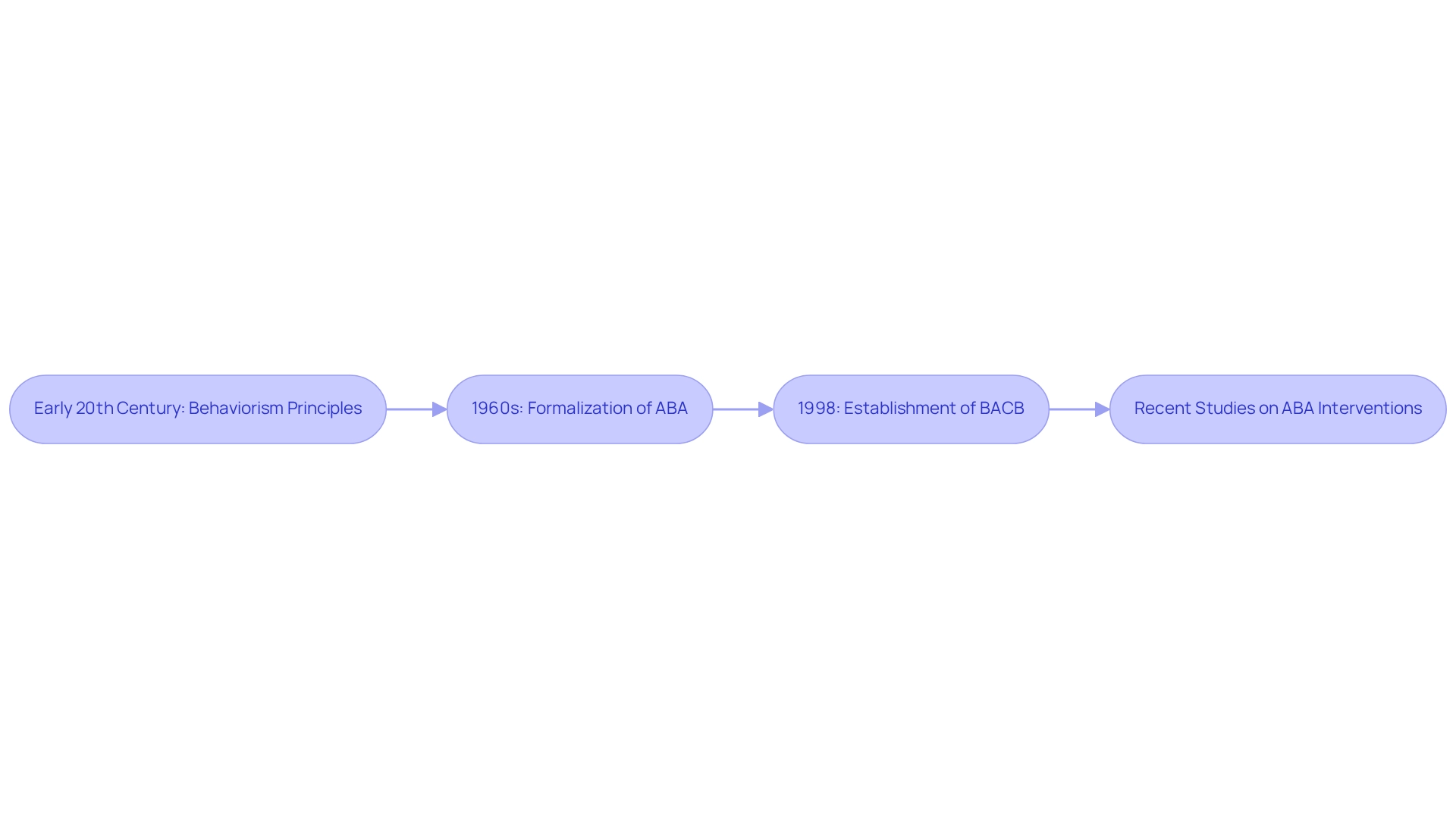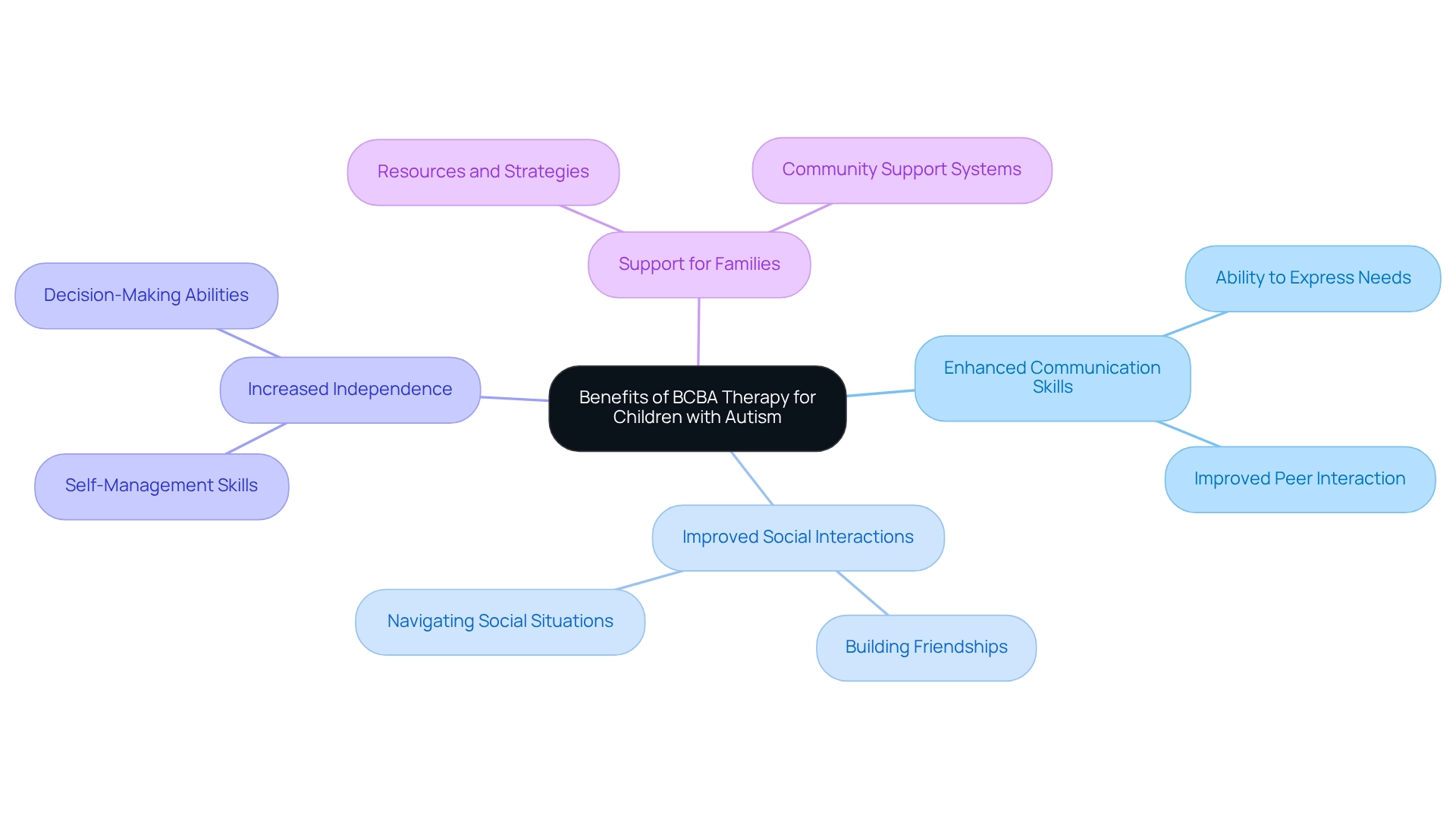Overview
BCBA therapy, rooted in the principles of Applied Behavior Analysis, is dedicated to enhancing the lives of individuals with autism spectrum disorder and other developmental disabilities through tailored interventions. This evidence-based approach not only addresses challenging behaviors but also nurtures skill development and fosters positive social interactions.
Research supports that children engaged in such therapies often experience significant improvements in both academic and personal outcomes. As you explore this journey, consider how these personalized strategies can make a meaningful difference in your child's life, offering hope and encouragement for a brighter future.
Introduction
In today's world, where understanding and addressing the needs of individuals with autism spectrum disorder (ASD) is more crucial than ever, BCBA therapy shines as a beacon of hope. This specialized form of Applied Behavior Analysis (ABA) is dedicated to enhancing behaviors and skills, allowing individuals to flourish in structured environments designed to meet their unique challenges. Grounded in the principles of behaviorism and supported by evidence-based practices, BCBA therapy not only seeks to modify challenging behaviors but also enriches the overall quality of life for its participants.
As technology increasingly integrates into therapeutic practices, the importance of BCBA therapy becomes even clearer. It provides families with essential tools and strategies to support their loved ones effectively. Through its rich history, core principles, and proven benefits, BCBA therapy emerges as a vital resource in the journey toward empowerment and success for children with autism. Together, we can explore this transformative approach and discover how it can make a meaningful difference in the lives of those we care about.
Define BCBA Therapy: Principles and Significance
In the field of Applied Behavior Analysis (ABA), understanding what is BCBA therapy is crucial for interventions, especially for individuals with autism spectrum disorder (ASD) and other developmental disabilities. These extensively trained experts are dedicated to evaluating and enhancing behaviors, crafting personalized treatment plans grounded in behavioral principles. The evidence-based approach of behavior analysis, often described as what is BCBA therapy, is not just about modifying challenging behaviors; it’s about enriching the overall quality of life for individuals by fostering positive behaviors and skill development. This nurturing treatment creates structured environments where individuals can flourish and reach their fullest potential.
Recent research underscores the transformative impact of behavioral analysis interventions, revealing significant improvements in academic achievement and learning outcomes for students with diverse needs. For example, simple tools like contingency maps can effectively teach new skills, making learning accessible and engaging. Additionally, the integration of technology into behavioral support has proven invaluable, addressing the developmental needs of individuals with ASD and becoming a vital component of modern therapeutic practices.
As one parent insightfully remarked, "I don’t always have all the answers, but I do have Google," highlighting the importance of having accessible resources to navigate these challenges. By focusing on each child's unique abilities, behavioral consultation empowers families, paving the way for success and growth. Furthermore, a compelling case study titled 'How ABA Support Enhances Academic Learning' illustrates the positive influence of ABA support on academic progress, reinforcing the vital role of behavior analysis in fostering educational success.
Trace the History and Development of BCBA Therapy
Behavioral therapy has a rich history, originating in the early 20th century with the principles of behaviorism advocated by psychologists like John B. Watson and B.F. Skinner. The 1960s saw a pivotal moment with the formalization of Applied Behavior Analysis (ABA), especially through Dr. Ivar Lovaas's groundbreaking work with children diagnosed with autism. This era marked a transformative understanding of how to address behavioral challenges effectively.
A significant milestone occurred in 1998 with the establishment of the Analyst Certification Board (BACB), which introduced a standardized certification process for analysts. This initiative not only bolstered the credibility of practitioners but also reinforced a commitment to ethical and effective practices in the field. Today, the behavior analyst certification stands as a symbol of professionalism in behavior analysis, reflecting a dedication to high standards of care and efficacy in therapeutic interventions.
Recent studies have revealed promising outcomes in ABA interventions, with augmented reality showing a noteworthy effect size (g = 0.92). Additionally, a case study titled "Perception of Parents in Using Video Modeling to Improve Self-Help Skills of Children with Autism Spectrum Disorder" showcased positive feedback from parents regarding the accessibility and effectiveness of video modeling in enhancing their children's self-help skills. As Marcus Fuller noted, "These results validate PMAI can be effective when teaching academic skills to students with ASD; however, more studies are needed to better understand for whom and under what conditions PMAI is most effective." This underscores the ongoing need for further research into video-based interventions for individuals with ASD, emphasizing the evolving landscape of behavior analysis support and its practical applications.
As we navigate these developments together, it’s important to remember that each child’s journey is unique. Sharing your experiences and insights can foster a supportive community. Let’s continue to explore these resources and support one another in this vital work.

Examine Core Principles and Techniques of BCBA Therapy
Understanding the complexities of behavioral interventions can be daunting for families. At the heart of effective therapy lies a foundation built on key principles, such as reinforcement, punishment, and extinction. Techniques like Discrete Trial Training (DTT), Natural Environment Training (NET), and Functional Behavior Assessment (FBA) are essential tools in this journey. For instance, positive reinforcement strategies encourage desired behaviors, creating a nurturing environment for growth.
Data collection plays a crucial role in this process, allowing for the monitoring of progress and the adjustment of interventions as needed. BCBAs are dedicated to working closely with families and other professionals to explain what is BCBA therapy, crafting personalized treatment plans that cater to the unique needs of each individual. This collaborative approach not only ensures that interventions are effective but also upholds ethical standards, fostering trust and understanding.
As you navigate this path, remember that you are not alone. Sharing your experiences and seeking support can make a significant difference. Together, we can create a supportive community that prioritizes the well-being of every individual.
Highlight Benefits of BCBA Therapy for Children with Autism
Behavioral consultation offers numerous benefits for children with autism, including enhanced communication skills, improved social interactions, and increased independence. Research shows that children who engage in behavioral interventions often experience significant growth in their ability to connect with peers, express their needs, and navigate challenging situations. This journey not only fosters development but also creates a nurturing environment where families can learn effective strategies to encourage positive behaviors at home, illustrating what is BCBA therapy, which emphasizes an individualized approach to thoughtfully address each child's unique strengths and challenges. This personalized attention leads to meaningful improvements in their overall quality of life, allowing them to thrive in various settings.
As parents, you are not alone in this process; there are resources and support systems available to help you every step of the way. Together, we can create a brighter future for your child.

Conclusion
BCBA therapy serves as a crucial lifeline for individuals with autism spectrum disorder, rooted in evidence-based practices that not only tackle challenging behaviors but also elevate overall quality of life. By utilizing personalized treatment plans crafted by skilled professionals, BCBA therapy empowers children and their families to confidently navigate the complexities of autism. The incorporation of technology and innovative strategies further enhances the effectiveness of this therapy, fostering structured environments where individuals can truly thrive.
The historical journey of BCBA therapy highlights its evolution and the increasing acknowledgment of its importance in behavioral health. With origins in behaviorism and the establishment of professional standards, BCBA therapy has consistently adapted to address the needs of those it supports. A steadfast commitment to research and improvement ensures that techniques remain relevant and effective, making a profound impact on the lives of children with autism.
Ultimately, the advantages of BCBA therapy extend far beyond simple behavioral modification; they embrace a holistic approach that nurtures communication, social interaction, and independence. As families engage with this transformative therapy, they not only observe their loved ones flourish but also acquire invaluable tools to support their growth. The promise of BCBA therapy lies in its ability to create pathways for empowerment and success, affirming its role as a beacon of hope in the journey of individuals with autism. We invite families to explore this supportive resource and witness the positive changes it can bring to their lives.
Frequently Asked Questions
What is BCBA therapy?
BCBA therapy refers to the interventions and strategies employed by Board Certified Behavior Analysts (BCBAs) to evaluate and enhance behaviors, particularly for individuals with autism spectrum disorder (ASD) and other developmental disabilities. It focuses on creating personalized treatment plans based on behavioral principles.
How does BCBA therapy benefit individuals with autism spectrum disorder?
BCBA therapy enriches the overall quality of life for individuals by fostering positive behaviors and skill development. It creates structured environments where individuals can thrive and reach their fullest potential.
What evidence supports the effectiveness of BCBA therapy?
Recent research shows that behavioral analysis interventions lead to significant improvements in academic achievement and learning outcomes for students with diverse needs. Tools like contingency maps are effective in teaching new skills, making the learning process engaging and accessible.
How has technology been integrated into BCBA therapy?
The integration of technology into behavioral support has become essential, addressing the developmental needs of individuals with ASD and enhancing modern therapeutic practices.
How does behavioral consultation empower families?
Behavioral consultation focuses on each child's unique abilities, providing families with the resources and support needed to navigate challenges, thereby paving the way for success and growth.
Can you provide an example of the impact of ABA support on academic learning?
A compelling case study titled 'How ABA Support Enhances Academic Learning' illustrates the positive influence of ABA support on academic progress, reinforcing the vital role of behavior analysis in fostering educational success.




